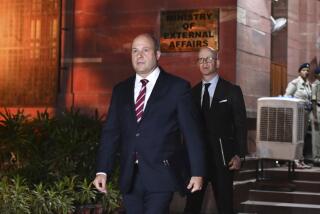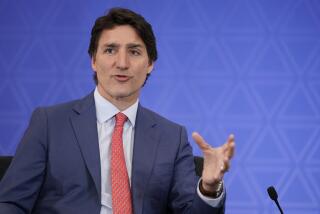Kerry seeks to mollify India after diplomat’s arrest in New York
- Share via
WASHINGTON – Secretary of State John F. Kerry on Wednesday “expressed his regret” to a senior Indian official about the treatment of an Indian diplomat who was arrested last week in New York, although he didn’t concede that U.S. authorities had broken any rules during her detention, the State Department said.
Kerry’s telephone call sought to calm a diplomatic furor over the treatment of Devyani Khobragade, a deputy consul general who was arrested and charged with visa fraud Thursday.
Indian officials have protested that she was strip-searched and jailed with the general prison population at a federal building in Manhattan, in violation of diplomatic rules, while she waited for her case to be handled. She was released on bail the same day.
Kerry telephoned Indian National Security Adviser Shivshankar Menon to say he “empathizes” with Indian outrage over the case, according to a State Department statement. But, the statement added, Kerry also “understands very deeply the importance of enforcing our laws and protecting victims” and “expects that laws will be followed by everyone here in our country.”
In addition to the visa fraud allegations, federal authorities have charged Khobragade with breaking U.S. law by paying her housekeeper only $3.31 an hour, a third of the federal minimum wage.
Indian authorities have demanded an apology from the State Department. In retaliation for the incident, they removed security barriers around the U.S. Embassy in New Delhi, asked that special airport passes issued to U.S. diplomats be returned and sought to block duty-free imports of alcohol for the embassy.
Kerry thought the phone call was “positive” and hoped the incident wouldn’t damage relations between the two countries, officials said. The Indian Foreign Ministry said it was committed to providing “full security” for all diplomats.
But it was not immediately clear whether the call would ease tension in India, where leaders across the political spectrum have been demanding retaliation against the United States.
Earlier Wednesday, Indian Foreign Minister Salman Kurshid said he would bring the 39-year-old Khobragade back to India “to restore her dignity.”
National media had reported a plan to shift her to a United Nations post that would provide greater legal immunity. But Marie Harf, the State Department’s deputy spokesperson, said U.S. officials had received no notification that such a change was planned.
Harf said U.S. officials continue to examine how the diplomat’s case was handled, but have found no reason to suspect that rules were broken. The U.S. Marshals Service maintains that Khobragade was treated like any other suspect.
Indian Embassy officials didn’t immediately respond Wednesday to requests for comment.
U.S. officials have worked hard to strengthen the country’s relationship with India, which they see as key to helping stabilize South and Central Asia and offsetting the growing power of China. The Obama administration is eager to maintain the support of India – the No. 2 customer for Iran’s oil – for tough sanctions that restrict foreign purchases of Tehran’s petroleum.
One South Asia specialist predicted that Kerry’s call would not satisfy the Indians.
“This is an ‘expression of regret.’ It definitely won’t be seen as an apology in India,” said Jonah Blank, a political scientist at RAND Corp. who formerly advised Kerry as a Senate Foreign Relations Committee staffer.
The United States has been an uncompromising defender of diplomatic immunity and would be protesting vigorously if a U.S. diplomat charged with a nonviolent crime were treated in a similar manner, Blank said. He recalled how U.S. officials insisted that Pakistan could not detain CIA contractor Raymond Davis, who shot and killed two men in Lahore in 2011.
By contrast, a U.S. law enforcement official called on U.S. authorities not to back off in the face of Indian criticism.
Jon Adler, president of the Federal Law Enforcement Officers Assn., said those arrested by the agency “are treated fairly and equally, and the Marshals Service doesn’t exempt anyone due to their gender, national origin or good looks.”
“Perhaps Indian officials should direct their outrage towards Ms. Khobragade for her alleged visa fraud and the alleged servant wages she paid her housekeeper,” Adler said.
Twitter: @richtpau
More to Read
Sign up for Essential California
The most important California stories and recommendations in your inbox every morning.
You may occasionally receive promotional content from the Los Angeles Times.











